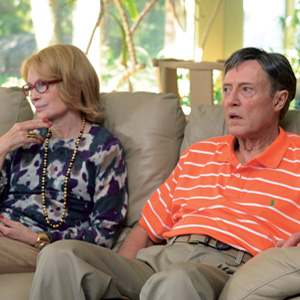

The bracingly negative filmmaker Todd Solondz, who is coming to the Camera Cinemas July 21, has made a string of controversial, often difficult to watch, tragi-comedies. His newest, Dark Horse, is his briefest yet. It’s a sharp retort to frat-pack/mumblecore celebrations of the adult big-baby experience.
Protagonist Abe (former Stanford student Jordan Gelber) is cocooned at his parents’ Long Island house. His room is stuffed with collectible action figures from Toys “R” Us. Abe nurses his grievances under the care of a sweet, dippy mother (Mia Farrow, perfect in the role) whom he regularly skins at their backgammon games.
The hulking overgrown kid sort of works for his father, a minor strip-mall developer. The father is played by Christopher Walken, wearing an inexpensive acrylic toupee. Ashen with disappointment, Walken looks at his do-nothing son like someone peering into an open grave.
At a wedding, Abe meets Miranda (Selma Blair, in one of her best roles). She is the luckless, humiliated Vi from Solondz’s Storytelling; Miranda is apparently another one of those women who changed her first name in hope of better fortune. Or she might have made up the new name as an alias, to pass on to the persistent Abe.
Abe tries to press her for a first date. Miranda is so helpless under the weight of a terrible depression that Abe feels he can proposes marriage to her. She eventually accepts, of course.
Dark Horse‘s deliberately unsteady narrative starts to disintegrate. Abe’s foray into the realm of fantasy makes sense. Even before an incident knocks Abe into a dream world, solipsistic daydreams of his own coolness overwhelm him. One can’t believe Abe’s grudges against his successful brother, Richard, the doctor of the family. And it’s ridiculous to believe that Abe was thwarted by his family, even if he says things like “Do you know, if it weren’t for my dad, I could be a singer? Now I’m even too old for American Idol.”
In these dreams, Marie (Donna Murphy) embodies Abe’s terrified obsession with the difference between good and bad girls—she doubles as an office doormat and as secret cougar.
When we’re in the world of Abe’s fantasies, Solondz is at his sharpest; he’s cleaning up after a decade’s worth of Seth Rogan and Mark Duplass comedies, which invited us to see the arrested-development life as cute and boyish. If you want to be tough about it, this failure to grow up represents a rotten streak that runs through much of suburban American male behavior.
Not that it’s better anywhere else in the world—one of the regular oppositions in Solondz’s film is between Americans bursting with privilege and foreigners who can barely contain their contempt.
The people in Solondz’s films are so badly behaved that only supernatural figures (ghosts, for instance, in Life During Wartime) can adequately shame them. The victims are so ground down that one actor alone can’t take all the punishment, as in Solondz’s 2004 abortion comedy Palindromes, which was the starting point for the multi-character format Todd Haynes later used in I’m Not There.
Dark Horse continues Solondz’s cinema of betrayal of trust. It furthers his films’ argument for a dreadful symbiotic link between bulliers and the bullied. And it adds to his annals of torture-centric families. Solondz’s material is the stuff of melodramatic tragedy, and yet his movies seem to be developing into entertainments. Like John Waters’ satires, they’ve gone past the point of being excruciating and come out funny—and, lately, strangely reasonable.
Solondz doesn’t seem to be prosecuting the characters in Dark Horse, as he sometimes did in his critically vaunted and distributor-blighted films Happiness and Storytelling. Abe’s combination of stiff neck and missing spine suggest a fully worked view of human failings, the kind Solondz demonstrated in his 1995 breakthrough, Welcome to the Dollhouse.
And still Solondz’s Arbus eye seems to foresee the awfulness to come. The day I saw Dark Horse, the Penn State investigation was on the radio, and if anything sounded like it came straight from a Solondz script …
Director Todd Solandz will be in-house for a Q&A following the 3:00pm screening on Saturday.
NR; 86 min.



